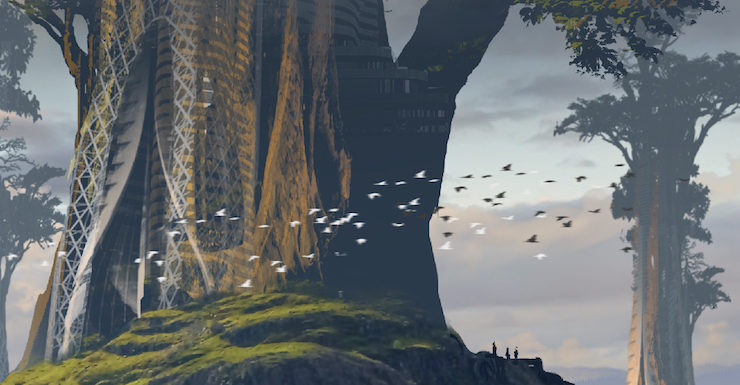When I was a kid you couldn’t move for stories where the alien-ness of the new world was the point. Certainly the ’70s equivalent of YA fiction was full of bold human explorers meeting weird planets and weirder inhabitants, even if a lot of those denizens turned out to be really very human indeed, except that some other apparent monster was their larval stage, say, or they had a symbiotic relationship with something interesting. And if you looked hard enough you could find, say, Lem’s Solaris, which is probably still the benchmark for the truly alien in fiction.
Either the alien planet trend went out of fashion, or those books just didn’t get written as much for adults, or else I just missed out a lot, but until relatively recently I just didn’t run into books about people encountering the alien on the alien’s home turf. In the last few years, though, there has been a distinct flowering (a particularly apt phrase in one case) of books about colonising the alien world, and the compromises we might have to make to do so.
I think the growing public interest in exoplanets and space exploration generally has certainly played into this, and it’s a canon I’ve added to myself, both with Children of Time (in a way, because as a terraformed world it’s not really alien) and now with The Expert System’s Brother. Brother is all about making arrangements to live with the alien, and unfortunately I can’t really go into detail as to just what hoops the colonists have had to jump through there without spoiling the story. It is a novella set many generations after first landfall on the unnamed green world, though. Several centuries have passed, and the human population retain little memory of where they came from or who they once were. Their lives are (at first glance) bucolic, even idyllic.
In the books I flag up below, a key difference between each story is how long people have been there, and what they retain.
Planetfall by Emma Newman
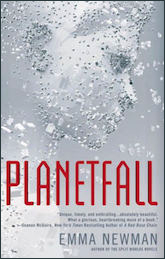 In stark contrast to most of the below–and to Brother—the colony in Planetfall is still in its first generation, a ship-full of idealists following a religious visionary to a planet where they expected to find God. And God is there, in a way, as an inexplicable alien structure/organism that will have nothing to do with them, and the planet otherwise is a poisonous wasteland. The adaptation of the colonists here is that they are entirely inward-looking, relying on printer technology for everything and circulating the same pool of molecular building blocks on a world where their very future seems vastly in doubt.
In stark contrast to most of the below–and to Brother—the colony in Planetfall is still in its first generation, a ship-full of idealists following a religious visionary to a planet where they expected to find God. And God is there, in a way, as an inexplicable alien structure/organism that will have nothing to do with them, and the planet otherwise is a poisonous wasteland. The adaptation of the colonists here is that they are entirely inward-looking, relying on printer technology for everything and circulating the same pool of molecular building blocks on a world where their very future seems vastly in doubt.
Dark Eden by Chris Beckett
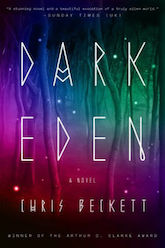 The humans in Dark Eden have been on-world for a while, but after a disastrous start, their culture is somewhere around the stone age, with vague legends mixing the origins with the memories of the children they are all descended from (so the Arrival from Earth is no more or less important than the story of The Big Fight between their ancestral parents). The world of Dark Eden is fascinating – sunless, with habitation only possible within craters where the warmth of the active core can leak out. The expansion and development of the tribal human society is the substance of the book and its two sequels, and it presents humans adapting in fascinating ways to a very alien world.
The humans in Dark Eden have been on-world for a while, but after a disastrous start, their culture is somewhere around the stone age, with vague legends mixing the origins with the memories of the children they are all descended from (so the Arrival from Earth is no more or less important than the story of The Big Fight between their ancestral parents). The world of Dark Eden is fascinating – sunless, with habitation only possible within craters where the warmth of the active core can leak out. The expansion and development of the tribal human society is the substance of the book and its two sequels, and it presents humans adapting in fascinating ways to a very alien world.
Hidden Sun by Jaine Fenn
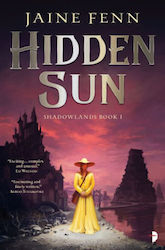 Fenn’s upcoming release tells the story of a world some ways on from the starter colony of Planetfall. Here, humans have diverged into two definite populations: the more familiar Shadowkin are much like us, but cannot tolerate the direct sunlight of the world they’ve made their home. Out in the open live the Skykin, though, who have formed a symbiotic relationship with a native life form that alters them to better fit their harsh home. Hidden Sun is a cracking read, the first of an anticipated new series which obviously has a lot of secrets still to reveal.
Fenn’s upcoming release tells the story of a world some ways on from the starter colony of Planetfall. Here, humans have diverged into two definite populations: the more familiar Shadowkin are much like us, but cannot tolerate the direct sunlight of the world they’ve made their home. Out in the open live the Skykin, though, who have formed a symbiotic relationship with a native life form that alters them to better fit their harsh home. Hidden Sun is a cracking read, the first of an anticipated new series which obviously has a lot of secrets still to reveal.
Semiosis by Sue Burke
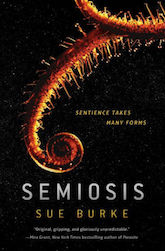 Burke gives us a fascinating world where evolution has been creating steadily more complex and inter-related ecosystems for far longer than on Earth, and where the dominant sentient life is easily overlooked by the human colonists, being plant-like rather than the mobile animals they find. The vegetal masters of her world dominate the planet by chemical stimulus and reward, existing in complex controlling relationships with each other and with animals, and Burke shows us humans discovering and adapting to these relationships over many generations in a truly thoughtful and elegant sequence of vignettes.
Burke gives us a fascinating world where evolution has been creating steadily more complex and inter-related ecosystems for far longer than on Earth, and where the dominant sentient life is easily overlooked by the human colonists, being plant-like rather than the mobile animals they find. The vegetal masters of her world dominate the planet by chemical stimulus and reward, existing in complex controlling relationships with each other and with animals, and Burke shows us humans discovering and adapting to these relationships over many generations in a truly thoughtful and elegant sequence of vignettes.
Glorious Angels by Justina Robson
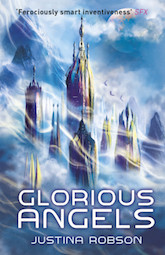 This is at the far end of the colonial spectrum from Planetfall – the complex human cultures of this alien world have their own peculiarities that may or may not owe something to the planet they have had to adapt to. They have an advanced civilization, but one which has nonetheless forgotten its origins. It includes complex hereditary castes with their own competencies, and a multiple god-queen who influences her subjects by scent. And then there’s the Karoo, either an alien life form or some engineered life that had got entirely out of hand. Sp,e of the most inhuman and fascinating fictional extraterrestrials I’ve come across, the Karoo haven’t really noticed that the humans are fighting a war against them. They like humans, in fact, Specifically, they like devouring them, because eating things is how they learn.
This is at the far end of the colonial spectrum from Planetfall – the complex human cultures of this alien world have their own peculiarities that may or may not owe something to the planet they have had to adapt to. They have an advanced civilization, but one which has nonetheless forgotten its origins. It includes complex hereditary castes with their own competencies, and a multiple god-queen who influences her subjects by scent. And then there’s the Karoo, either an alien life form or some engineered life that had got entirely out of hand. Sp,e of the most inhuman and fascinating fictional extraterrestrials I’ve come across, the Karoo haven’t really noticed that the humans are fighting a war against them. They like humans, in fact, Specifically, they like devouring them, because eating things is how they learn.
 Adrian Tchaikovsky is the author of the acclaimed Shadows of the Apt fantasy series and the epic science fiction blockbuster Children of Time. His latest novella, The Expert System’s Brother, is available from Tor.com Publishing. He has been nominated for the David Gemmell Legend Award and a British Fantasy Society Award. In civilian life he is a lawyer, gamer and amateur entomologist.
Adrian Tchaikovsky is the author of the acclaimed Shadows of the Apt fantasy series and the epic science fiction blockbuster Children of Time. His latest novella, The Expert System’s Brother, is available from Tor.com Publishing. He has been nominated for the David Gemmell Legend Award and a British Fantasy Society Award. In civilian life he is a lawyer, gamer and amateur entomologist.










